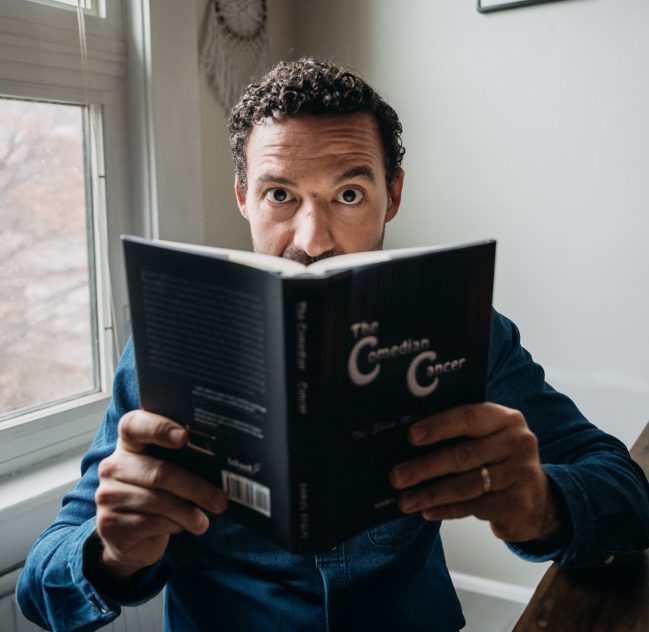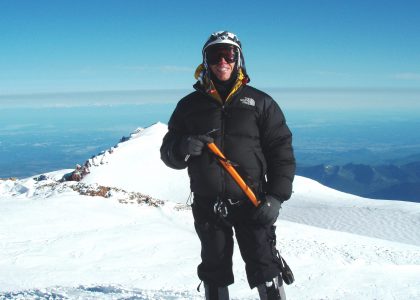Laughing in the Face of Adversity: Comedian and Tellwell’s July Author of the Month Daniel Stolfi’s Inspiring Memoir
Discover the healing power of humour and resilience in ‘The Comedian vs Cancer,’ a roller-coaster journey through laughter and tears
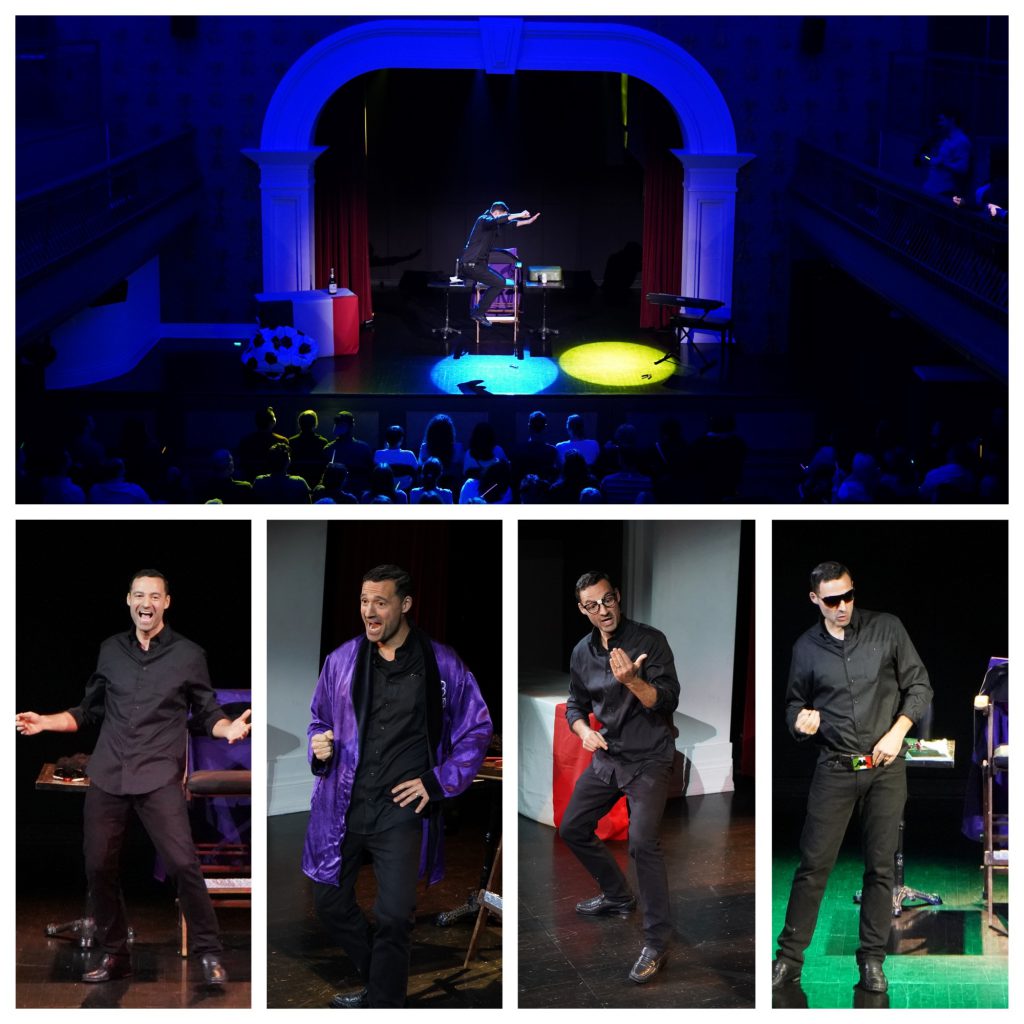
I believe humour has the ability to heal. Humour is my therapy. I could be having an awful day, but then turn on my favourite comedy show or stand-up comedy special and instantly forget about what was making my day so awful.
Daniel Stolfi
Join Daniel Stolfi on an extraordinary journey through laughter, tears, and resilience in his captivating memoir, The Comedian vs Cancer. In 2008, a shocking diagnosis of stage III acute non–Hodgkin’s T-lymphoblastic lymphoma threw his life into turmoil. Facing aggressive treatment, Daniel found solace in humour, weaving together a narrative that is both raw and uproariously funny.
From chemotherapy to stand-up comedy, Daniel shares his highs and lows. His story is a testament to the power of laughter, love, and determination in the face of adversity.
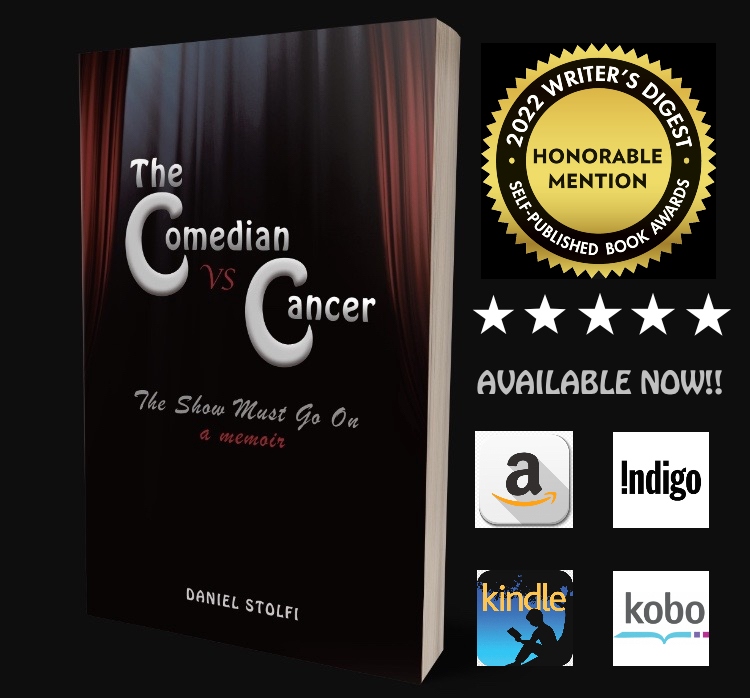
Can you share with us the inspiration behind writing The Comedian vs Cancer, and what motivated you to document your journey with such candor and humour?
There were multiple inspirational moments that occurred while writing The Comedian vs Cancer. It was a thirteen-year process from the first words on the page to the final product, so I had lots of inspiring and discouraging moments along the way.
Initially, I never had the intention to write a memoir. When I first started my chemotherapy treatment at twenty-five, I began writing out the details of my diagnosis and cancer journey in real time so I could have a somewhat concise record of what I went through to maybe look back on one day and say, “Hey, I did that.” Inspiration first struck when I travelled to New York City in the dead of winter to study comedy at the Upright Citizens Brigade. I was five years post treatment, with seventy-five pages of written work sitting on my laptop, while I sat in the New York City Public Library with endless hours between stand-up comedy gigs. I used that time and space to fully flesh out a rough draft. I mean, what’s more inspiring than New York?
I was also inspired by other memoir writers who wrote about their cancer experiences, which gave me hope during my treatment. I thought maybe one day someone will find hope and inspiration from reading my story. It truly felt like a pipe dream at the time. I had looked into traditional publishing avenues, created a thirty-page chapter-by-chapter breakdown, wrote the personalized query letters, etc., but was told no so many times that it inspired me even more to get my memoir out there. It wasn’t until the pandemic happened and I had a daughter that I reached my inspiration peak and found Tellwell to help make my pipe dream a reality!
The candour and humour that I wrote with came from my natural desire to write comedy. As a comedian, my mind is constantly trying to find the funny in everything, and cancer is no exception. The cancer experience is a roller coaster ride of emotions, and I wanted to emulate that experience through my writing by having moments of levity juxtaposed with moments of humour. I really wanted to lift some of the weight that comes with the heavy subject matter of cancer off the reader’s shoulders, and humour allowed me to accomplish that.
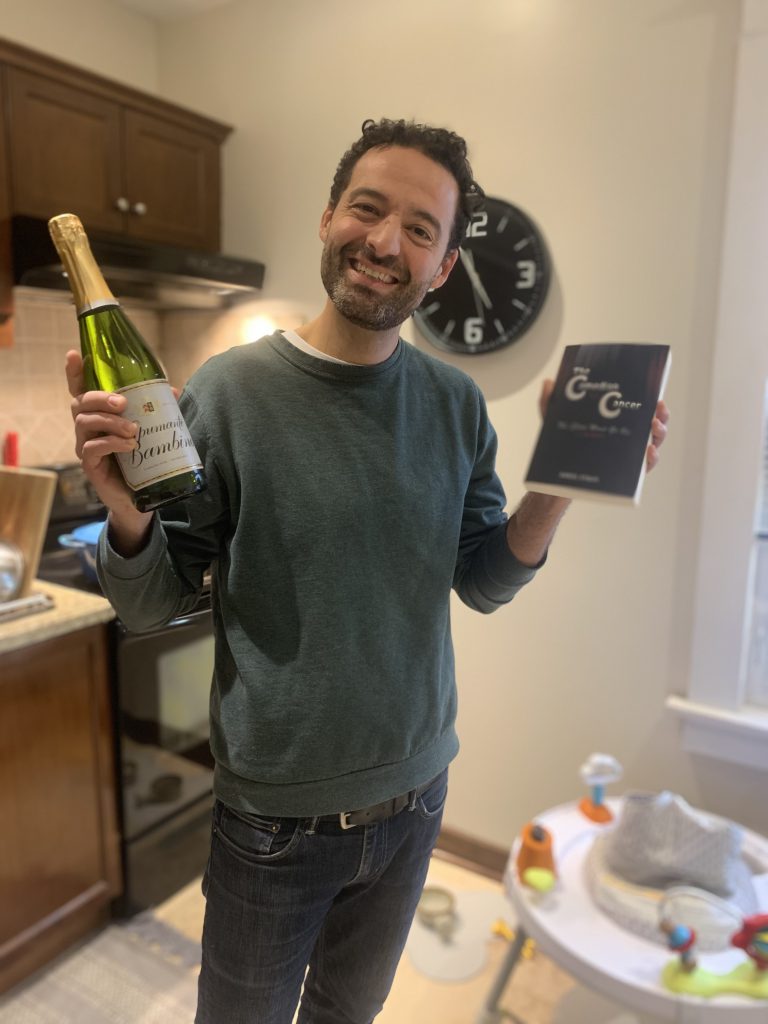
Your memoir delves into some deeply personal and challenging experiences, including battling cancer at a young age. How did you navigate the process of revisiting these moments while writing, and what insights did you gain about yourself in the process?
My treatment plan was a long and difficult one: two years of weekly chemotherapy, ten rounds of radiation, spinal taps, blood transfusions and all that fun stuff. I knew that in order to revisit these moments, I’d need to give myself space and time before going back there. I kept detailed journal entries as I navigated my treatment, and was able to look back on those entries when I needed to dive into some of the darker memories, even though it was challenging. I think what I learned most about myself through this process was just how much I had grown as a person since being diagnosed at the age of twenty-five. I also learned that I don’t like to take no for an answer. The rejection is real! But I was determined to tell my story through this medium and share it with as many people as I could. I believe that great stories are meant to be shared, as they can change lives, and I feel so fortunate that I have been able to share mine in this way.
Humour plays a significant role in your storytelling, even when tackling difficult subjects like cancer. How do you believe humour can be a powerful tool in coping with adversity, and how did it help you during your own journey?
I believe humour has the ability to heal. Humour is my therapy. I could be having an awful day, but then turn on my favourite comedy show or stand-up comedy special and instantly forget about what was making my day so awful. As a comedian, I needed to laugh not at my journey, but through my journey. It was cathartic for me to make the odd joke to the doctor or nurse about whatever was going on during that time, whether they were checking out my butt for hemorrhoids or asking if I was pregnant (truth).
I found the whole process to be so strange and surreal that I couldn’t help but laugh at what I was going through. I also found that other patients and survivors shared in this dark sense of “tumor humour” as well. We’d laugh through our trauma, laugh through the pain, and laugh at the absurdity of it all. Laughter helped me build relationships and allowed for conversations to happen and unfold organically. Humour allowed us to be vulnerable with each other and share in a way that felt safe. Humour has the power to connect, and it helped me connect with other survivors and find much-needed support.
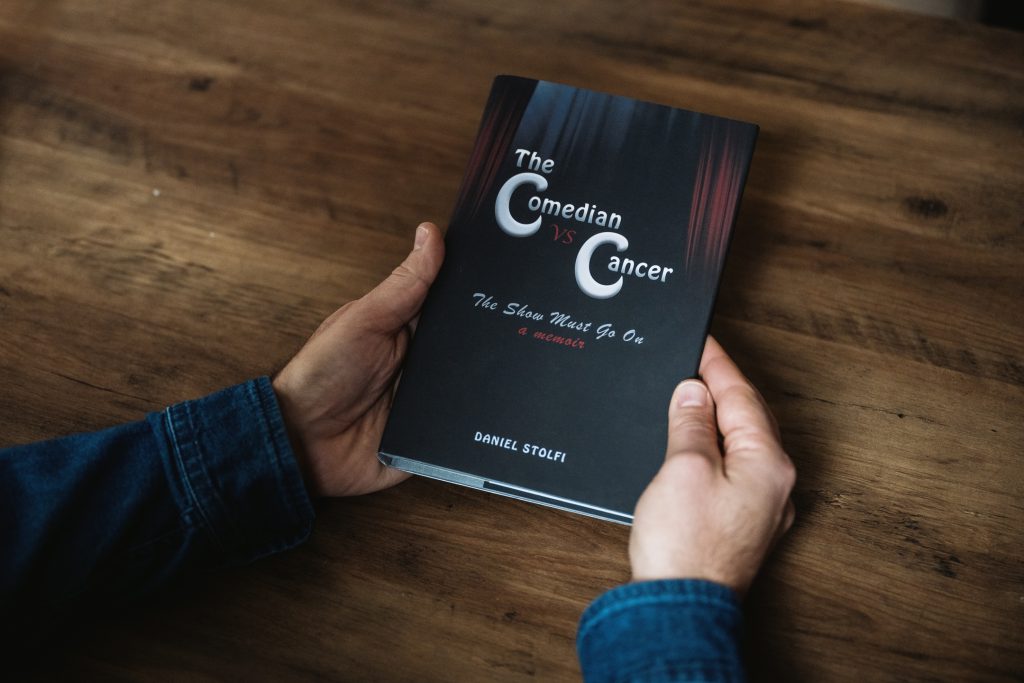
As an actor, writer, comedian, and producer, you’ve worked across various mediums, including television, film, and stage. Did you find it challenging to write a memoir? What differences stood out to you the most? How did you adjust to them?
MEMOIR IS SOOOO CHALLENGING! I took a number of courses and workshops, met with agents and writers, and I read countless memoirs to get a sense of what I was getting myself into and to learn as much as I could. Writing for film, TV, and the stage is vastly different than writing memoir. In television, film, and theatre the audience ends up seeing the final product on the screen or on the stage. Dialogue is written differently. The way to set up scenes and even the general formatting and structure is different. With memoir, you really have to paint the picture for the reader. “Show don’t tell” was my biggest note from a writer friend of mine who was writing a memoir of her own and guiding me through my writing journey. This was the biggest difference. I had to write in a way that allowed the reader to use all their senses to feel like they were there with you along for the ride. Hats off to all my peer readers and my editor at Tellwell who really helped shape my sentences in a way that kept my writing true to my voice and my comedy, while also keeping the formatting and structure of the text clean and professional. Editors are key! Will anyone be editing my answers for this interview? Please do!
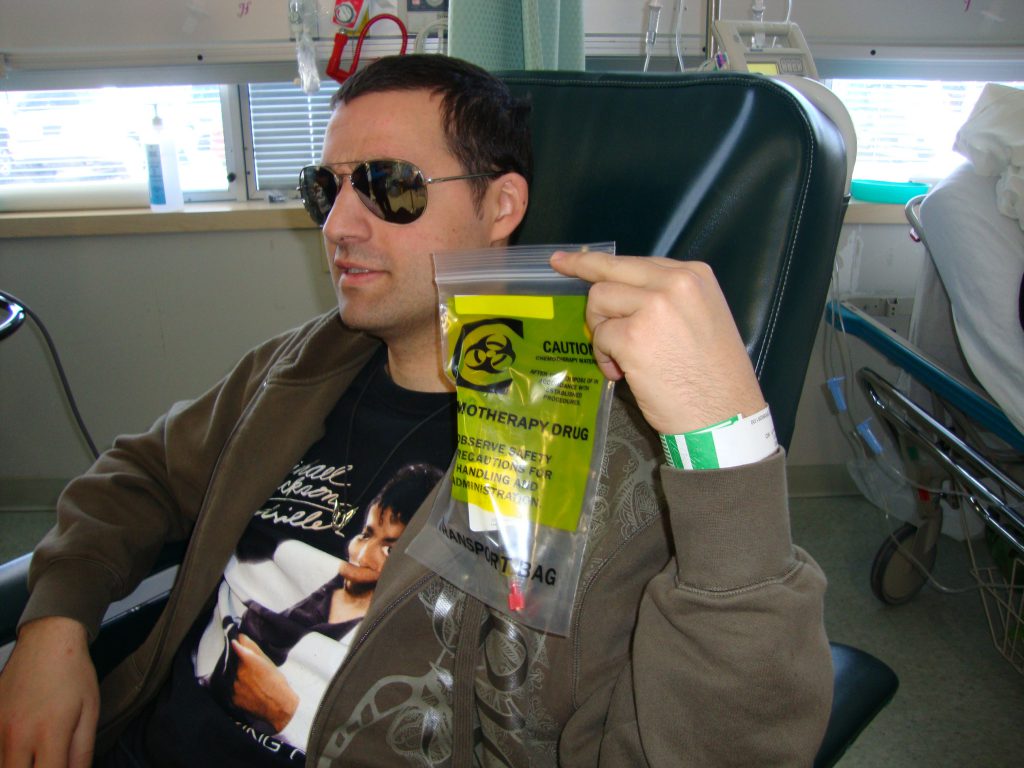
Your memoir is highly personal and deals with some tough issues. What advice would you give to potential memoir authors who aren’t sure how to tackle difficult subjects, and what was your first step in starting the writing process?
As cliché as it may sound, my first step in the writing process was to just write. I wasn’t thinking long-term of how I was going to get this memoir out there or how big the mountain was going to be. I didn’t know what my future held while I was sick, but I also didn’t know that I was writing a memoir! I think because I approached it from the perspective of “I’m just writing this to write,” it sort of took on a life of its own and I just went along for the bumpy wild and crazy ride.
Advice I’d give to potential writers who aren’t sure how to tackle difficult subjects is to really try to look at your experience as a story being told by another version of yourself. Think of it as your present self as the author sharing the story of your past self as the character. It makes it feel like you are writing the story of a character that experienced all these things, as opposed to you. It may help you to find more freedom to open up. Nothing was off limits for me. Some of it was embarrassing or difficult, but it was the truth and it happened. I didn’t want to sugar-coat anything or shy away from something because it might make someone feel uncomfortable. Cancer is uncomfortable. Cancer sucks.
Is there anything else you’d like to add?
I’m so grateful that I finally self-published my memoir. I really felt my story was going to live on the stage only, which was the first medium in which I shared my cancer experience. Getting this book out seemed impossible, and the number of doors that closed in my face was very discouraging. But when I heard about the self-publishing route and all that Tellwell could provide to make it happen, I knew it was a realistic goal. Keeping the creative control and artistic integrity in my writing was so freeing and fulfilling, and self-publishing allowed me to have that. I feel so honoured to have been nominated as Author of the Month. I never expected anything like this to happen. I’m very grateful. Finally, best of luck to all those future memoir writers out there! Start writing, don’t look back, and hang on for dear life!
To find out more about Daniel Stolfi check out his LinkTree and follow him on your favorite platforms.
